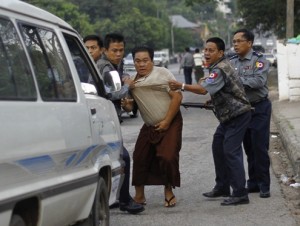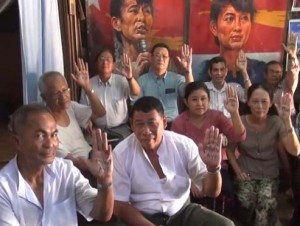Posts Tagged ‘Association Law’ (7 found)
Burma: Drop Charges Against Former Activist Monk
(Bangkok, April 26, 2016) – Burmese authorities should dismiss politically motivated immigration charges against a prominent former activist monk and release him from detention, Human Rights Watch said today […]
• • •Major Step to End Decades-Long Cycle of Political Arrests
(New York, April 12, 2016) – The new Burmese government, led by the National League for Democracy (NLD), has taken a major step in releasing approximately 200 political prisoners and detainees, Human Rights Watch said today […]
• • •AAPP Condemns the Use of Violence and Torture in Burma and Demands the Immediate Unconditional Release of All Political Prisoners
The recent violent crackdowns against the peaceful student demonstrators and their supports resulted in the detention of at least 127 people. AAPP vehemently condemns the disproportionate force used by the police and demands accountability for those responsible for the violence seen in both Letpadan and Rangoon […]
• • •Rule By Law: An Analysis of the Use of Legislation to Stifle Civil Society Space in Burma
This paper is primarily an analysis of the raft of legislation that is in the process of being pushed through parliament to target HRDs, activists, protestors and CSOs, and the threat that such legislation poses to their fundamental rights – which Burma is legally bound to respect and protect under the 2008 Constitution. This paper will also look at the current situation of political prisoners to demonstrate how the legislation is being misused in collaboration with a compliant judiciary and the Myanmar National Human Rights Commission […]
• • •Burma’s Draft Association Law: A Smokescreen for Further Repression?
 One of the main hopes for Burma’s recent political reforms has been for a vibrant, open and flourishing civil society – a vital component of any healthy democracy and an enabling environment for sustainable development. For Burma’s people to feel invested in its country’s political, economic and social development, they must be allowed to participate and they must be empowered. Yet participation and empowerment cannot happen if there are onerous or arbitrary restrictions on the right to freedom of association.
One of the main hopes for Burma’s recent political reforms has been for a vibrant, open and flourishing civil society – a vital component of any healthy democracy and an enabling environment for sustainable development. For Burma’s people to feel invested in its country’s political, economic and social development, they must be allowed to participate and they must be empowered. Yet participation and empowerment cannot happen if there are onerous or arbitrary restrictions on the right to freedom of association.
It was therefore disheartening to see the draft Association Law, published by the Public Affairs Management Committee on 27 July in a state-run newspaper. The draft law violated constitutional and international standards of free association, with international law permitting only limited and narrowly defined exceptions. It also flouted accepted international standards for laws on associations or not-for-profit organisations. The draft law made registration compulsory rather than voluntary, with unregistered associations prohibited from operating and facing disproportionate and draconian penalties of up to three years in prison as well as hefty fines for establishing or even participating in an unregistered association. In fact, the law would have needed to have been almost entirely redrafted to comply with international standards […]
Myanmar Civil Society Meeting Legislature on Proposed Association Draft Law
The representatives of 281 civil society organizations, community based organizations and networks from upper and lower Myanmar held the meeting with Hluttaw representatives on August 15 in Nyapyitaw regarding the proposed Association Draft Law. This is the outcome of the Myanmar civil society organizations’ efforts reaching out to the Legislature and raising […]
• • •25 Years On, Freedom of Association Remains an Illusion
 On 27 July, the Public Affairs Management Committee published the draft Association Law with a notice calling for comments and recommendations. The 9 August deadline to send comments allows so little time for recommendations that it makes it almost meaningless. Civil society organizations quickly reacted to the draft bill by publishing a statement endorsed by 87 organizations. The statement rejects the draft law and calls for any discussion in the Parliament to be suspended in order to allow sufficient time for broad and meaningful consultations.
On 27 July, the Public Affairs Management Committee published the draft Association Law with a notice calling for comments and recommendations. The 9 August deadline to send comments allows so little time for recommendations that it makes it almost meaningless. Civil society organizations quickly reacted to the draft bill by publishing a statement endorsed by 87 organizations. The statement rejects the draft law and calls for any discussion in the Parliament to be suspended in order to allow sufficient time for broad and meaningful consultations.
Similarly the Myanmar National Human Rights Commission (MNHRC) draft law was published on 7 July following similar proceedings. Again, the draft law was immediately tabled in the Parliament, limiting time for consultations and recommendations by civil society organizations.
The draft Association Law violates people’s right to freedom of association. The law must be almost entirely redrafted if it is to comply with international legal standards. In its current form it serves no other purpose than perpetuating government’s control over civil society […]
• • •








 All posts
All posts